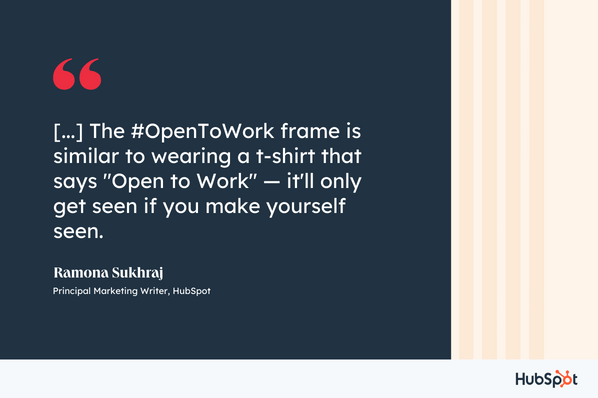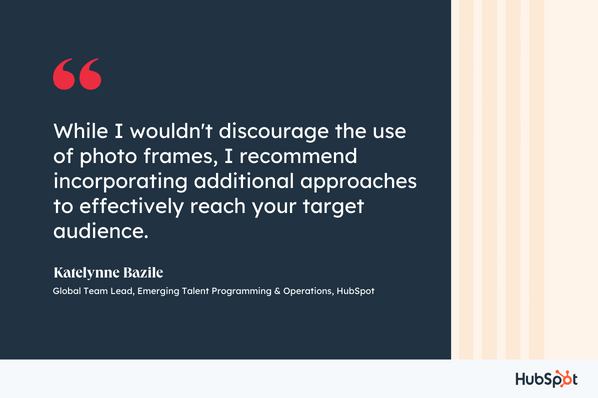Welcome to HubSpot Perspectives, a series where HubSpotters weigh in on the latest business and marketing trends.
“The biggest red flag on LinkedIn is the ‘open to work’ symbol.” This hot take is brought to you by former Google recruiter Nolan Church.
And the dialogue continues. As I browse through my LinkedIn feed, there are still ongoing conversations about the #OpenToWork profile photo frame.
Should you use it? Does it work? Is there even a small chance it may make you look desperate or unoriginal as a job seeker?
Featured Voices:
- Katelynne Bazile, Global Team Lead, Emerging Talent Programming & Operations at HubSpot
- Ramona Sukhraj, Principal Marketing Writer at HubSpot
Yes, #OpenToWork has potential.
But it’s not the only strategy job seekers should be using to land a new role.
“In my experience, it seems like the #OpenToWork frame is similar to wearing a t-shirt that says ”Open to Work" — it'll only get seen if you make yourself seen,” says Ramona Sukhraj, Principal Marketing Writer at HubSpot.
Sukhraj was recently in the job market herself.
“It‘s a visual aid that makes it clear you’re open to employment conversations on the platform, but if you don‘t post, engage, or make yourself visible to the right groups, the effort is mostly in vain. So if you’re going to add it, be prepared to be active.”

In other words, it’s not enough to add the photo frame, sit back, and wait for the job offers to roll in.
The Recruiter Perspective
Katelynne Bazile, Global Team Lead, Emerging Talent Programming & Operations at HubSpot, shared the same sentiment as Sukhraj when I asked about the effectiveness of LinkedIn photo frames.
“While the #OpenToWork and #Hiring photo frames initially served a useful purpose by helping individuals easily identify those seeking or offering job opportunities, the current job market's volatility and high number of individuals using these frames have diminished their effectiveness,” says Bazile.
“As the frames have become more prevalent due to increased layoffs, they may no longer have the impact they once did when first launched.”
And she makes a good point about layoffs. So far in 2024, over 74,000 employees have been laid off, including nearly 300 tech companies.
Unpacking the Hot Takes
Regardless, Bazile said she wouldn't categorize the #OpenToWork photo frame as “a signal of desperation or harmful to job-seeking candidates.”
Though she does suggest that there are better ways to make yourself stand out.
“Personally, I have found more impact in actively engaging on LinkedIn, interacting with content from key figures and utilizing the platform's tools to connect with relevant job opportunities,” says Bazile.

“It's important to adapt and refine our strategies as the platform evolves. While I wouldn't discourage the use of photo frames, I recommend incorporating additional approaches to effectively reach your target audience.”
Let’s face it — there are approximately 40 million people searching for jobs on LinkedIn every week. In today’s job market, it’s important to build your network, start conversations, and create a plan to make yourself stand out.
The Bright Side
Sukhraj did have some good news to share on the photo-frame front.
“I will say, when I initially posted a feed update when adding the [#OpenToWork] frame, I received messages from several recruiters within seconds,” says Ramona.
“This makes me believe some folks are tracking the hashtag or perhaps even particular job titles."
And this makes sense — data shows that 77% of employers are still using LinkedIn to source candidates.
But I’d say the biggest takeaway here is that LinkedIn photo frames are still just one small part of a larger strategy.
The Bottom Line
To answer the overarching question posed in this article, I’d say yes — LinkedIn photo frames can actually be helpful. But they’re not made to stand on their own, and you’ll still need to do the heavy lifting to land your next gig.
Want to hear our thoughts about a specific topic? Drop your idea in this form, and we may just feature it in an upcoming post.
from Marketing https://blog.hubspot.com/marketing/linkedin-photo-frames
Welcome to HubSpot Perspectives, a series where HubSpotters weigh in on the latest business and marketing trends.
“The biggest red flag on LinkedIn is the ‘open to work’ symbol.” This hot take is brought to you by former Google recruiter Nolan Church.
And the dialogue continues. As I browse through my LinkedIn feed, there are still ongoing conversations about the #OpenToWork profile photo frame.
Should you use it? Does it work? Is there even a small chance it may make you look desperate or unoriginal as a job seeker?
Featured Voices:
- Katelynne Bazile, Global Team Lead, Emerging Talent Programming & Operations at HubSpot
- Ramona Sukhraj, Principal Marketing Writer at HubSpot
Yes, #OpenToWork has potential.
But it’s not the only strategy job seekers should be using to land a new role.
“In my experience, it seems like the #OpenToWork frame is similar to wearing a t-shirt that says ”Open to Work" — it'll only get seen if you make yourself seen,” says Ramona Sukhraj, Principal Marketing Writer at HubSpot.
Sukhraj was recently in the job market herself.
“It‘s a visual aid that makes it clear you’re open to employment conversations on the platform, but if you don‘t post, engage, or make yourself visible to the right groups, the effort is mostly in vain. So if you’re going to add it, be prepared to be active.”

In other words, it’s not enough to add the photo frame, sit back, and wait for the job offers to roll in.
The Recruiter Perspective
Katelynne Bazile, Global Team Lead, Emerging Talent Programming & Operations at HubSpot, shared the same sentiment as Sukhraj when I asked about the effectiveness of LinkedIn photo frames.
“While the #OpenToWork and #Hiring photo frames initially served a useful purpose by helping individuals easily identify those seeking or offering job opportunities, the current job market's volatility and high number of individuals using these frames have diminished their effectiveness,” says Bazile.
“As the frames have become more prevalent due to increased layoffs, they may no longer have the impact they once did when first launched.”
And she makes a good point about layoffs. So far in 2024, over 74,000 employees have been laid off, including nearly 300 tech companies.
Unpacking the Hot Takes
Regardless, Bazile said she wouldn't categorize the #OpenToWork photo frame as “a signal of desperation or harmful to job-seeking candidates.”
Though she does suggest that there are better ways to make yourself stand out.
“Personally, I have found more impact in actively engaging on LinkedIn, interacting with content from key figures and utilizing the platform's tools to connect with relevant job opportunities,” says Bazile.

“It's important to adapt and refine our strategies as the platform evolves. While I wouldn't discourage the use of photo frames, I recommend incorporating additional approaches to effectively reach your target audience.”
Let’s face it — there are approximately 40 million people searching for jobs on LinkedIn every week. In today’s job market, it’s important to build your network, start conversations, and create a plan to make yourself stand out.
The Bright Side
Sukhraj did have some good news to share on the photo-frame front.
“I will say, when I initially posted a feed update when adding the [#OpenToWork] frame, I received messages from several recruiters within seconds,” says Ramona.
“This makes me believe some folks are tracking the hashtag or perhaps even particular job titles."
And this makes sense — data shows that 77% of employers are still using LinkedIn to source candidates.
But I’d say the biggest takeaway here is that LinkedIn photo frames are still just one small part of a larger strategy.
The Bottom Line
To answer the overarching question posed in this article, I’d say yes — LinkedIn photo frames can actually be helpful. But they’re not made to stand on their own, and you’ll still need to do the heavy lifting to land your next gig.
Want to hear our thoughts about a specific topic? Drop your idea in this form, and we may just feature it in an upcoming post.


No hay comentarios:
Publicar un comentario